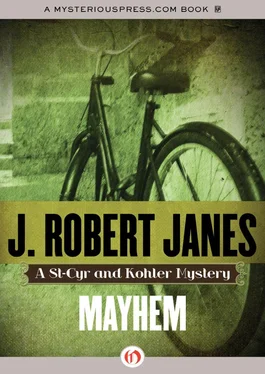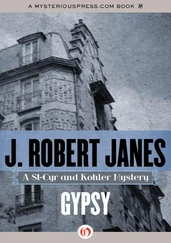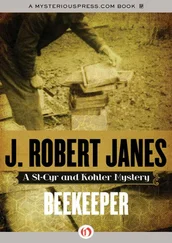J. Janes - Mayhem
Здесь есть возможность читать онлайн «J. Janes - Mayhem» весь текст электронной книги совершенно бесплатно (целиком полную версию без сокращений). В некоторых случаях можно слушать аудио, скачать через торрент в формате fb2 и присутствует краткое содержание. Год выпуска: 0101, Издательство: MysteriousPress.com/Open Road, Жанр: Исторический детектив, Полицейский детектив, на английском языке. Описание произведения, (предисловие) а так же отзывы посетителей доступны на портале библиотеки ЛибКат.
- Название:Mayhem
- Автор:
- Издательство:MysteriousPress.com/Open Road
- Жанр:
- Год:0101
- ISBN:нет данных
- Рейтинг книги:5 / 5. Голосов: 1
-
Избранное:Добавить в избранное
- Отзывы:
-
Ваша оценка:
- 100
- 1
- 2
- 3
- 4
- 5
Mayhem: краткое содержание, описание и аннотация
Предлагаем к чтению аннотацию, описание, краткое содержание или предисловие (зависит от того, что написал сам автор книги «Mayhem»). Если вы не нашли необходимую информацию о книге — напишите в комментариях, мы постараемся отыскать её.
Mayhem — читать онлайн бесплатно полную книгу (весь текст) целиком
Ниже представлен текст книги, разбитый по страницам. Система сохранения места последней прочитанной страницы, позволяет с удобством читать онлайн бесплатно книгу «Mayhem», без необходимости каждый раз заново искать на чём Вы остановились. Поставьте закладку, и сможете в любой момент перейти на страницу, на которой закончили чтение.
Интервал:
Закладка:
A reader of minds, eh? ‘Remember to get my car serviced. The carburettor needs adjustment.’
‘That’s only water in the fuel. I’ll give it a dose of alcohol. That’ll help burn off everything.’
That and the speed.
‘It’s nice not to have to worry about other cars,’ sighed St-Cyr. ‘That’s one thing the war’s done for us. Cleared the roads of unnecessary traffic.’
‘There’s a convoy ahead. Hang on.’
One of them had to have the last word, so for now he’d let it be but he wished the worry would go away, wished Hermann hadn’t insisted on that photograph of the two of them. If that should ever get into the wrong hands … Who’d understand that the smile or the grin had been partly out of necessity and partly out of … what? Respect? Ah no, not quite – that wasn’t the word he’d use though there was respect. There had to be after what the two of them had been through.
Friendship then? Partnership? A certain begrudging loyalty? God forgive him, he didn’t know. It was so hard to define. With Hermann it was as if, to survive and live with himself, he had to leave his body, to rise above it all and look down on the two of them only to laugh at some of the Gestapo’s antics and laugh at his own predicament. God’s curse.
Laugh if you will, my friend, he said, but it’s no laughing matter.
Ah no, it certainly wasn’t.
The street was narrow and slicked by the rain that had departed. At four o’clock the granite paving bricks were dark, and the shouts of the boys echoed in the distance as the street rose up to their angular shapes which were etched against the hurrying dusk.
Small, square, two- and three-storeyed houses of brick or stucco crowded in but here and there a bit of garden had been left.
There were no cars – how could there have been? All bicycles, and the velo-taxis some used to earn their living, were either still on the streets in the heart of the city, or carefully put away.
Alone, St-Cyr walked towards the boys. Would it be France against Germany today, or the Resistance against the Gestapo?
Being boys, they wouldn’t say if asked but would only dart secretive looks at one another as their leader stepped forward to answer, Priests against the Nuns, or some such thing.
Not that they ever really made fun of him. Being a cop did set one apart from all others, no matter how much one wanted to be included.
Belleville was Belleville – the XX Arrondissement and the home of so many little people. All walks of life, several races – immigrants not just from the Auvergne in the early days, but from Russia, Armenia, Hungary, and more recently, in the late 1930s, Jews fleeing from the Nazis in Germany. Algerians too. Even a family of Negroes who now lived in almost total seclusion and terror for their lives as did the few remaining Jews.
The rue Laurence Savart was little different from so many others. Shopkeepers, artisans, bank clerks and brick-layers (if not taken by the Todt Organization to build the defensive works of the Atlantic Wall); tailors, seamstresses, insurance brokers, printers, cooks and doormen. Perhaps that was what he liked most about the place. Its life.
The chestnut tree in Madame Auger’s garden had been newly pruned – firewood again! Given another winter like the last one, the woman wouldn’t have a stick left.
The Vachons were tidy people; their garden, what he could see of it, had been well put to bed. Leaves had been worked into the soil. Vachon grew such fabulous tomatoes, the jungle of them could only have been fertilized by secret additions of the family’s excrement.
The beans had been magnificent too, whereas …
The house at number 3 was very pleasantly situated behind a low brick wall and imitation Louis XIV wrought-iron fence. The gateposts were of brick and the iron gate was substantial.
St-Cyr went to open the gate, then thought better of it. Pausing, he swept his eyes over the garden. All the plants had had to be removed – the rose bushes and the magnolias his mother had loved, her irises and hyacinths …
Like so many others these days he’d raised what crops he could. But work with Kohler had often taken him away and the wife … well, Marianne, she was no lover of the soil.
At a shout, ‘Hey … oo-oo, Monsieur the Detective,’ he turned and saw the ball bouncing towards him down the long slope of the narrow street, dark against the dark.
‘A moment, boys,’ he shouted, dropping his briefcase to meet the ball and begin to work it up to them. ‘Split … come on, you – you also, my friend. Hup … Hup … Go for it!’
He was past the first of them, deftly working the ball from foot to foot before expertly passing it to a forward. For the next ten minutes he forgot himself, forgot the war, the murder,the wife – all of it.
As he walked back to the house, he threw a tired but grateful salute to his friends.
Unseen by him, one of them whispered to the new boy from Alsace, ‘He’s a specialist in murder but has lost his beautiful car.’
‘Does he carry a gun?’
‘Ah no, they have taken that from him too.’
‘Marianne, I’m home.’
St-Cyr flung the briefcase into a chair and went through to the kitchen. ‘Marianne,’ he called again.
Five days in the south on a dead end that had seen them camping overnight in Barbizon and on the road at dawn.
‘Marianne …’ The house was cold, the draining board, sink and table empty.
He went back through to the sitting-room to stare at the wireless, then at the couch with its little bits of Chantilly lace, then at his favourite armchair by the fire.
Nothing … the books he’d been reading – the volume of Daudet was still spread open on an arm. Everything was just the way he’d left it when Kohler had barged in to take him away.
Parting the curtains, he looked out into the darkness. ‘Marianne …’
She’d been unhappy, upset – so many things. Being the second wife of a cop hadn’t been any better for her than it had been for the first wife of that cop.
Too many late nights, too many murders, and now, why now the war and all that it entailed.
Had she taken their son to see her mother? She’d have needed a special ausweis for that, a thing not easy to come by. No, not at all. Quimper, like the rest of the coastal areas, was in the Forbidden Zone. The boy was only four years old and very close to her. Though she would have been worried about him, she could have done it. She was a girl of great determination, a woman with a mind of her own and the body to go with it. Ah yes, the body.
St-Cyr pinched the bridge of his nose and shut his eyes. This war, he said. This lousy war.
Kohler and his Gestapo associates lived at the Hotel Boccador which the Gestapo had requisitioned for the duration. Hermann could find him a fast answer but would it make any difference?
Heading back through to the kitchen, he collected the briefcase on the way and took from it the three, fist-sized lumps of coal he’d managed to pick up from a railway siding near Lyon. The loaf of bread Kohler had squeezed out of a baker in Beaune had got a little stale and dirty, but the round of cheese the Bavarian had stolen was just as good as ever.
Looking at the cheese, St-Cyr nodded sadly and said to the walls as if to a priest, ‘Someone’s loss is my gain.’
There was virtually no milk in Paris. The boy had had to have his calcium. Kohler had insisted.
Spread on the table were St-Cyr’s bread coupons and the green tickets for the week’s ration of meat, wine and potatoes et cetera, should he be able to purchase such things.
As he put through the call, he experienced again the humiliation and sadness the defeat of France had brought. ‘Hermann, it’s me. My wife’s gone.’
Читать дальшеИнтервал:
Закладка:
Похожие книги на «Mayhem»
Представляем Вашему вниманию похожие книги на «Mayhem» списком для выбора. Мы отобрали схожую по названию и смыслу литературу в надежде предоставить читателям больше вариантов отыскать новые, интересные, ещё непрочитанные произведения.
Обсуждение, отзывы о книге «Mayhem» и просто собственные мнения читателей. Оставьте ваши комментарии, напишите, что Вы думаете о произведении, его смысле или главных героях. Укажите что конкретно понравилось, а что нет, и почему Вы так считаете.












